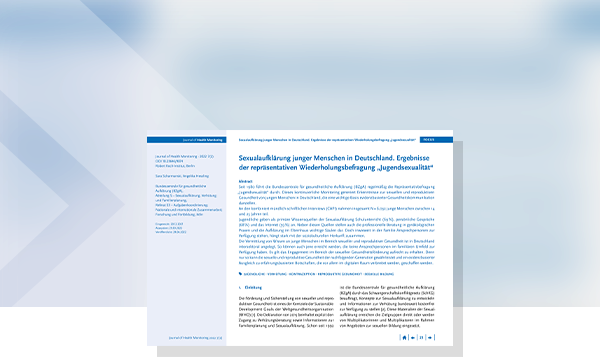Seit 1980 führt die Bundeszentrale für gesundheitliche Aufklärung (BZgA) regelmäßig die Repräsentativbefragung „Jugendsexualität“ durch. Dieses kontinuierliche Monitoring generiert Erkenntnisse zur sexuellen und reproduktiven Gesundheit von jungen Menschen in Deutschland, die eine wichtige Basis evidenzbasierter Gesundheitskommunikation darstellen.
An den kombiniert mündlich-schriftlichen Interviews (CAPI) nahmen insgesamt N = 6.032 junge Menschen zwischen 14 und 25 Jahren teil.
Jugendliche geben als primäre Wissensquellen der Sexualaufklärung Schulunterricht (69 %), persönliche Gespräche (68 %) und das Internet (59 %) an. Neben diesen Quellen stellen auch die professionelle Beratung in gynäkologischen Praxen und die Aufklärung im Elternhaus wichtige Säulen dar. Doch inwieweit in der Familie Ansprechpersonen zur Verfügung stehen, hängt stark mit der soziokulturellen Herkunft zusammen.
Die Vermittlung von Wissen an junge Menschen im Bereich sexueller und reproduktiver Gesundheit ist in Deutschland intersektoral angelegt. So können auch jene erreicht werden, die keine Ansprechpersonen im familiären Umfeld zur Verfügung haben. Es gilt das Engagement im Bereich der sexuellen Gesundheitsförderung aufrecht zu erhalten. Denn nur so kann die sexuelle und reproduktive Gesundheit der nachfolgenden Generation gewährleistet und ein evidenzbasierter Ausgleich zu erfahrungsbasierten Botschaften, die vor allem im digitalen Raum verbreitet werden, geschaffen werden.


